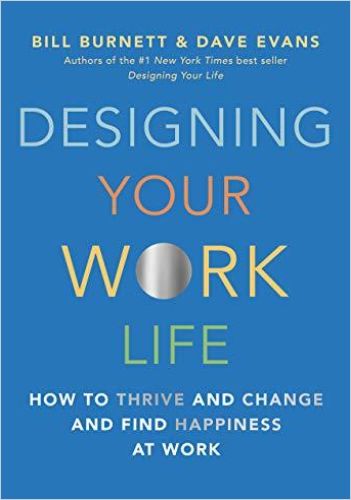Bill Burnett and Dave Evans, co-directors of the Stanford Life Design Lab, run down how designers approach problems and how you can get more out of work and life by using a designer’s mind-set.

Think Like a Designer
Design thinkers start out curious, keep open, flexible minds, try out different solutions to see what happens and learn from their mistakes. They seek solutions to solve short- and long-term problems simultaneously. If you feel stuck at your job, designers Bill Burnett and Dave Evans, co-directors of the Stanford Life Design Lab, offer designer-minded steps to first change your attitude, then your results.
The authors detail the specific approach designers take to problem-solving. Not every exercise will apply to you, but they offer a sound resource for improving your work life.
Reviewers found much to appreciate in Burnett’s and Evans’s method. Writing about Designing Your Work Life, the New York Times said, “Life has questions. They have answers…Learn how to find a fulfilling career…Learn how to better navigate life’s big-moment decisions and kill your ‘wicked problems dead’.” Publishers Weekly wrote, “Perhaps the book’s most important lesson is that the only failure is settling for a life that makes one unhappy.”
Mind-Sets
Burnett and Evans list the aspects of the mind-set designers develop, and urge you to apply them to crafting a more meaningful work experience: Be curious; try stuff; reframe problems; know it’s a process; ask for help; and tell your story.
Reframe
Life, Burnett and Evans say, with a certain lack of originality, is a journey. They remind you that no destination exists in which you will, magically, be completely happy. They recommend accepting your situation, designing a path forward and keeping a “Good Work Journal” to keep track of what you like about your work and what engages you.
“Workview” and “Lifeview”
Your workview, Burnett and Evans detail, reflects the meaning and values you equate with good work, and your understanding of how work relates to money. Your lifeview explores these issues in relation to your life, your relationships and a higher power.
Money, impact and expression – three different ways for people to measure what they make, at work and in their lives. It’s a good way to measure how successful you are.Dave Evans, Bill Burnett
Many people believe they deserve lots of money for doing what they love. In fact, Burnett and Evans lament, that’s rare. Jobs are how you make money, they clarify, and are separate from your life.
Politics
Burnett and Evans show their understanding of realpolitik when they suggest you must understand your organization’s power dynamics. To grow your own influence, they recommend contributing to your company’s success in a way that matches its goals while garnering recognition for you.
Certain people are the brokers of yes.Dave Evans, Bill Burnett
Among the authors’ more perceptive guidance is their plainspoken statement that, during an office power play or values crisis, you should keep your head down. Usually, they write, these struggles resolve themselves – and, in the aftermath, you can align with whoever cleans up the mess.
You, Burnett and Evans insist, must always choose to quit and never have quitting thrust upon you. They cast quitting as a positive, generative choice. Generative quitters design their way out of jobs they no longer want. They reframe the move as an opportunity to pivot from a job well done to a new chapter.
Once you’ve lined up your next job, the authors stress, never burn your bridges. They further advocate that you help the person who gets your job succeed.
Self-Employment
Burnett and Evans counsel starting with a sideline to your current job and growing the future you imagine.
The next level means finding your own clients. Once you like the way your business is shaping up, set up a workflow. Raise your rates over time. Outsource parts of the work for a reasonable markup. That helps you grow your work capacity. If you want top pay, the authors disclose, give your clients an experience that is above and beyond the ordinary.
Original and Not
Burnett and Evans have an enviable work record of almost unbroken success. They teach at one of the most prestigious business schools in the world, and like other professors there, parlayed a popular class into a series of bestsellers. Many of their ideas are original and practicable. Many are regrettably familiar to any reader of business self-help books. Whether their guidance will help you or not may depend on your level of experience in the business world. The authors spend most of their days talking to students, and the advice they offer here seems to be aimed at that demographic. For those just entering the world of work, they offer sound tactics and a few counterintuitive suggestions worth following. For those with more experience, Burnett and Evans will shed little new light.
Companion guides by Burnett and Evans include Designing Your Life and the Designing Your Life Workbook.











